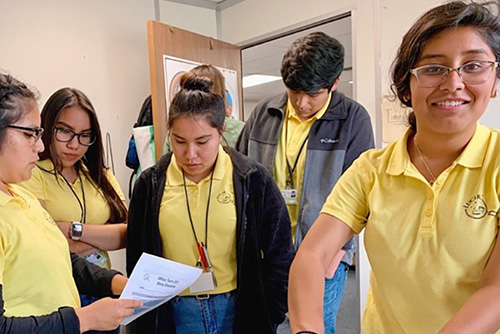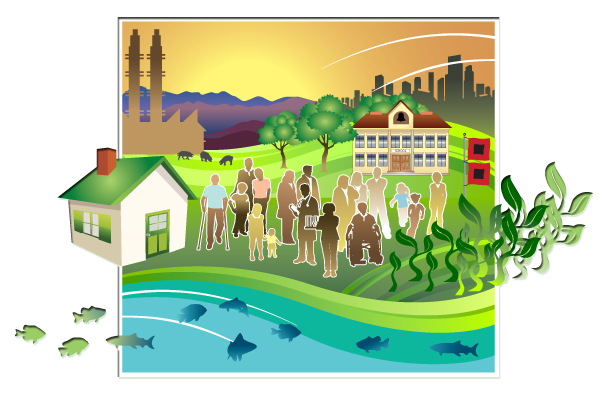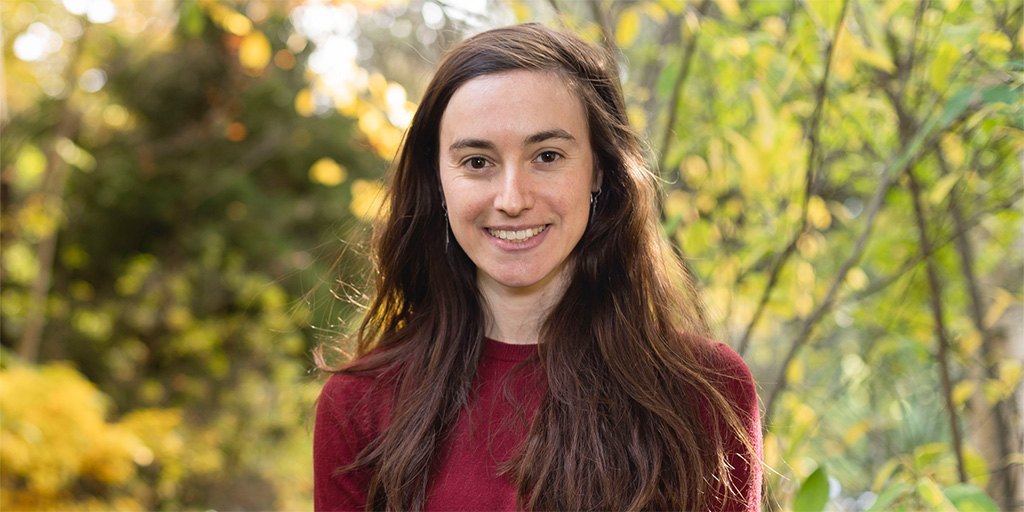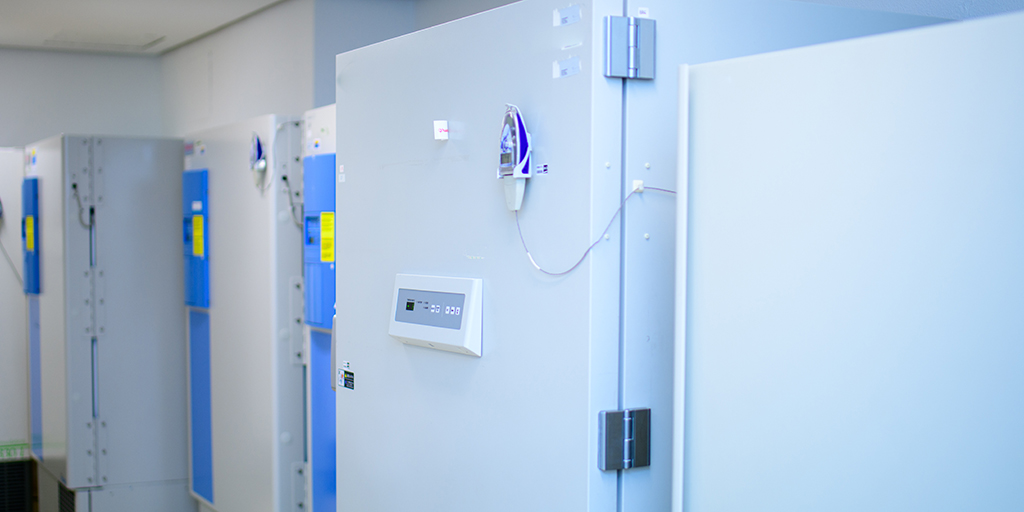Continuing Medical Education Helps Communicate Breast Cancer Risks to Children and Their Caregivers

Continuing medical education modules are an effective way to increase health care providers’ skills and comfort in communicating research findings to patients and their caregivers. Researchers with the Breast Cancer and the Environment Research Program (BCERP) found that such modules increased pediatric health care providers’ communication about the connection between environmental exposures during puberty and the risk of developing breast cancer.
The BCERP is a multi-disciplinary consortium of researchers, community partners, and a coordinating center. The consortium currently includes six studies funded by the NIEHS and the National Cancer Institute. The BCERP conducts research on the connection between environmental exposures and breast cancer and translates that research into practice in communities.
“The BCERP’s research has shown a strong link between certain environmental exposures during puberty and an increased risk of breast cancer,” said Kami Silk, Ph.D., researcher at the University of Delaware. “Reaching out to pediatric providers is a way to get this information to caregivers of children in this age group who can then implement breast cancer risk-reducing behaviors. We found that this route for research translation is an effective way to get health knowledge to those who will benefit from it.”
Continuing Medical Education Modules Translate Research to Medical Training
Health care providers are required to complete continuing education courses throughout their careers. Developing continuing medical education modules on breast cancer and related exposure risks for children is therefore an effective way to get this information to pediatric health care providers.
Researchers developed three training modules that consisted of videos, graphics, and slide presentations with audio narration. The first module presented information on the BCERP and its areas of research. The second module reviewed the connection between breast cancer risk and exposure to specific chemicals during certain developmental periods of the life span, including puberty. The third module focused on communication strategies related to environmental exposures and breast cancer risk.
“We developed the continuing medical education modules to give pediatric nurses, nurse practitioners, and pediatricians knowledge about breast cancer risk from exposures during childhood that we’ve learned from BCERP research,” explained Silk. “The modules were designed to help health care providers integrate BCERP health recommendations into well child visits.”
Pediatric Health Care Providers Implement New Knowledge in Practice

Although it was expected that the continuing education modules would increase providers’ knowledge of the link between environmental exposure and breast cancer risk, getting that information into the hands of patients and their caregivers was the true goal. Therefore, the researchers examined whether the second and third modules were effective at encouraging health care providers to discuss breast cancer risk-reducing behaviors in their medical practice with patients and their caregivers. To do this, health care providers were recruited from a variety of hospitals, medical practices, and academic medical centers and randomly assigned to complete one of the modules. The researchers surveyed health care providers on their attitude toward and knowledge of breast cancer risk immediately before and after completing the modules, as well as three weeks later.
Results indicated that the modules provided pediatric health care providers with information they did not previously know about environmental exposures at particular developmental periods of a child’s life. Furthermore, pediatric health care providers stated that the modules gave them new tools to effectively communicate with patients and their caregivers about these risks to help them reduce exposures. Although one module focused specifically on communication strategies, researchers found that the module that did not include communication strategies still increased providers’ frequency of communication.
This study supports the effectiveness of continuing medical education at enabling health care providers to communicate current science to patients and their caregivers. This study also indicates continuing medical education modules could be effective at translating research findings on associations between environmental exposures and risks of developing poor health outcomes to populations that need this information most.
“We were happy to hear that health care providers reported that they enjoyed the modules and received useful information from them,” reflected Silk. “Our goal is to get the BCERP’s results out to children and their caregivers who can use the information to reduce exposures. These continuing medical education modules are one good strategy because people trust their health care providers and often try to put in action what they recommend.”
In the future, the researchers would like to examine whether refresher training for health care providers is useful for maintaining their increased environmental health knowledge and communication of this knowledge with patients and their caregivers. They would also like to reach adolescents directly through video-based learning tools based on the content from the continuing medical education modules.
United Nations Releases Climate Change Report
The Intergovernmental Panel on Climate Change, the United Nations body for assessing the science related to climate change, finalized the first part of the 2022 Climate Change Assessment, The Physical Science Basis report. The full assessment will be released in 2022. The Physical Science Basis report presents the current physical understanding of the climate system and climate change and brings together evidence from climate science, process understanding, and global and regional climate simulations. The Intergovernmental Panel on Climate Change was created to provide policymakers regular scientific assessment on climate change, its implications, and potential future risks, and to suggest adaptation and mitigation options. The Physical Science Basis report includes a summary for policymakers, a technical summary, an interactive atlas, frequently asked questions, regional fact sheets, outreach material, data access, and the full report.
NIEHS Joins Global Chemicals and Health Network
NIEHS is an inaugural member of the World Health Organization’s Global Chemicals and Health Network, which is a global forum for discussion among policymakers and representatives about issues related to health and chemicals. One of NIEHS’s objectives in joining the network is to help improve coordination and communication between public health sectors and contribute to the strategic approach of international chemicals management. This objective and the planned approach are detailed in the Chemicals Road Map, which also contained the mandate from the World Health Organization to establish the network. The network’s first newsletter was published in June 2021 and has information about the following: an online self-training course on the Chemicals Road Map, case studies on road map implementation, guidance documents related to mercury and health, a report on children’s health and e-waste, and updates on the Global Chemicals and Health Network.
Webinar Now Available: Developing a Climate Change and Health Research Agenda for NIH
NIEHS hosted its first NIH-wide webinar on climate change and health, titled Developing a Climate Change and Health Research Agenda for the NIH: Adaptation, Equity and Big Data, in August. A recording of the event is now available. The webinar was the first in a series from the Climate Change and Health Working Group, which has existed for over a decade but is being revitalized due to current interest from the administration and from Congress. Rick Woychik, Ph.D., director of NIEHS and the National Toxicology Program, first set the stage for the webinar and the entire series by mentioning a recent report by the Intergovernmental Panel on Climate Change, which the U.N. Secretary-General described as a “code red for humanity.” Woychik also stressed the importance of collaborative work within NIH to address the health effects of climate change. Subsequent speakers then covered topics such as climate adaptation and health risks, climate justice, and data science and climate.

PEPH Environmental Health Chat Podcast Series
Engaging Youth in Research
PEPH Environmental Health Chat Podcast Series
Engaging Youth in Research

PEPH Grantee Highlight
Juan Parras
Juan Parras fights for environmental and social justice, guided by the principle that everyone, regardless of race or income is entitled to live, work, and play in a clean environment. Parras is the executive director and founder of Texas Environmental Justice Advocacy Services, which promotes environmental protection through education, policy development, community awareness, and legal action. It is a community partner of the NIEHS Superfund Research Program Centers at Texas A&M University and the Baylor College of Medicine. Parras is also a member of the White House Environmental Justice Advisory Council, which is tasked with providing advice and recommendations on how to address current and historic environmental injustices. Recently, Parras and his organization, working together with community members, state officials, researchers, and local nonprofits, evaluated human health hazards in Houston after Hurricanes Harvey and Laura. The partnerships generated valuable scientific evidence about pollution in local communities, and Parras emphasized the importance of translating the findings to inform policies to protect people and their well-being.
Funding Opportunites
Transition to Independent Environmental Health Research Career Award (K01 Independent Basic Experimental Studies with Humans Required)
The Transition to Independent Environmental Health Research career award is a 3-year bridge scholar development program for newly independent faculty who intend to pursue research careers in environmental health sciences. This funding opportunity is designed for applicants proposing to serve as the lead investigator of an independent clinical trial, a clinical trial feasibility study, or a separate ancillary study to an existing trial. For applicants not planning independent basic experimental studies with humans, there are two companion funding opportunities. Applicants planning independent clinical trials with specific application toward processes or with products in mind, must apply to the companion funding opportunity announcement, Transition to Independent Environmental Health Research Career Award (K01 Clinical Trial Required). Applicants not planning an independent clinical trial, or proposing to gain research experience in a clinical trial led by another investigator, must apply to companion funding opportunity announcement, Transition to Independent Environmental Health Research Career Award (K01 Clinical Trial Not Allowed). At the conclusion of the career development period the candidates are expected to demonstrate they can successfully compete for research funding in the environmental health sciences. Eligible candidates for the K01 award must have a research or health-professional doctoral degree and must be within three years of their appointment to their first independent faculty position at the time of submission (receipt date) of the application.
Deadline: October 12, 2021
Research on Autism Spectrum Disorders (R01 Clinical Trial Optional)
This award supports research designed to elucidate the etiology, epidemiology, diagnosis, and optimal means of service delivery in relation to Autism Spectrum Disorders (ASD). The Research Project Grant (R01) mechanism supports discrete, specified projects based in scientific areas that represent the investigators’ specific interests and competencies, and that fall within the mission of the participating NIH Institutes and Centers. Additional companion funding opportunities are available for a Small Research Grant (R03) which supports small, discrete, well-defined projects that can be completed in two years and that require limited resources (Research on Autism Spectrum Disorders (R03 Clinical Trial Optional)); and an Exploratory/Developmental Grant (R21) which encourages exploratory/developmental research by providing support for the early and conceptual stages of project development (Research on Autism Spectrum Disorders (R21 Clinical Trial Optional)). Basic research into the pathophysiology of ASD, including research on brain mechanisms, is of special interest. Also, of high priority are clinical and applied investigations that may lead to the development of new treatments and interventions.
Deadlines: June 16, 2021; October 16, 2021
Maximizing Opportunities for Scientific and Academic Independent Careers (MOSAIC) Postdoctoral Career Transition Award to Promote Diversity (K99/R00 Independent Clinical Trial Not Allowed)
Supports a cohort of early career, independent investigators from diverse backgrounds conducting research in NIH mission areas. The long-term goal of this program is to enhance diversity in the biomedical research workforce. The MOSAIC K99/R00 program is designed to facilitate a timely transition of promising postdoctoral researchers from diverse backgrounds from their mentored, postdoctoral research positions to independent, tenure-track or equivalent research-intensive faculty positions. The MOSAIC K99/R00 program will provide independent NIH research support before and after this transition to help awardees launch successful, independent research careers. This Funding Opportunity Announcement is designed specifically for applicants proposing research that does not involve leading an independent clinical trial, a clinical trial feasibility study, or an ancillary clinical trial. Applicants are permitted to propose research experience in a clinical trial led by a mentor or co-mentor. Applicants proposing a clinical trial or an ancillary clinical trial as lead investigator, should apply to PAR-21-272. Applicants proposing basic science experimental studies involving humans, should apply to PAR-21-273.
Deadline: October 24, 2021
Notice of Special Interest (NOSI): Research Supplements to Promote Re-entry and Reintegration Into Health-related Research Careers (Admin Supp - Clinical Trial Not Allowed)
Provides support for a mentored research training experience for individuals with high potential to re-enter or re-integrate into an active research career, after an interruption for family responsibilities or other qualifying circumstances. This program encourages reentry and reintegration administrative supplement applications to existing NIH research grants to support full- or part-time mentored research experiences by these individuals. The supplement grants are intended to provide these scientists an opportunity to update or extend their research skills and knowledge and prepare them to reestablish their careers in basic biomedical, behavioral, clinical, translational, or social science research. Reentry supplements provide research training opportunities to individuals with doctoral degrees who have had career interruptions of at least six months and no more than eight years. Reintegration supplements allow postdoctoral and predoctoral students the opportunity to transition to a new, safe, and supportive research environment.
Deadlines: November 1, 2021; December 1, 2021
Emerging Global Leader Award (K43 Independent Clinical Trial Required)
Provides research support and protected time (three to five years) to an early career research scientist from a low- or middle-income country who holds a junior faculty position at a low-or middle-income country academic or research institution. This FOA is designed specifically for applicants proposing to serve as the lead investigator of an independent clinical trial, a clinical trial feasibility study, or a separate ancillary clinical trial, as part of their research and career development. Applicants not planning an independent clinical trial, or proposing to gain research experience in a clinical trial led by another investigator, must apply to the companion FOA, Emerging Global Leader Award (K43 Independent Clinical Trial Not Allowed). NIEHS is interested in applications that address or seek to understand how exposures to toxic environmental insults alter biologic processes, are linked to disease initiation, progression or morbidity, and activities that lead to the development of prevention and intervention strategies to reduce environmentally induced diseases in low- and middle-income countries. Topics and disease outcomes of particular interest include airway diseases, cardiovascular disease and neurological disorders, children’s environmental health and the unique vulnerability of developing children to harmful environmental exposures including outcomes such as low birth weight or premature birth, and research exploring exposures during early life stages or critical windows of susceptibility that may directly or indirectly affect the risk of developing disease.
Deadline: November 3, 2021
Letter of Intent: Due 30 days prior to the application due date
Autism Centers of Excellence (ACE): Networks (R01 Clinical Trial Optional)
Supports research that will lead to better understanding of the causes and mechanisms underlying autism spectrum disorders, improved efficiency of methods of early identification and diagnosis, and more innovative and cost-effective services for individuals with autism spectrum disorders across their lifespan. ACE Networks consist of multiple sites focusing on a specific topic of research. Each network will submit one R01 application that includes subawards to the collaborating sites. An ACE Network application must require multiple sites for optimal design and conduct of the study. ACE Centers (Autism Centers of Excellence: Centers (P50 Clinical Trial Optional)) must support major multidisciplinary research programs, consisting of interdependent and interrelated research projects. Meaningful and committed interactions among the disciplines must be evident. Each project must have goals and objectives that focus on the common unifying theme that integrates the projects. Applications to both FOAs must include a Plan for Enhancing Diverse Perspectives.
Deadline: November 9, 2021
Letter of Intent: Due 30 days prior to the application due date
Innovative Approaches for Improving Environmental Health Literacy (R43/R44 Clinical Trial Not Allowed)
Solicits Phase I (R43), Phase II, and Fast-track (R44) Small Business Innovative Research grant applications from small business concerns in collaboration with environmental science researchers to develop novel tools, activities, or materials to build environmental health literacy for a variety of groups, including community members, health care and public health professionals, educators, and students of all ages. See Innovative Approaches for Improving Environmental health Literacy (R41/R42 Clinical Trial Not Allowed) which solicits Phase I (R41), Phase II (R42), and Fast-track (R42) Small Business Technology Transfer grant applications. As part of its Partnerships for Environmental Public Health Program, NIEHS is interested in developing tools that build capacity, improve environmental health literacy, and support citizen science endeavors. In addition, there is a need for improved approaches for communicating Environmental Health Science concepts for diverse audiences, including K-12 education, undergraduate and graduate education, and information for health care professionals. These approaches or resources should be fit-for-purpose to meet the needs of the following audiences: community members, health care and public health professionals, educators, and students of all ages.
Deadline: November 10, 2021
Letter of Intent: October 10, 2021
Mobile Health: Technology and Outcomes in Low- and Middle-Income Countries (R21/R33 – Clinical Trial Optional)
Encourages exploratory and developmental research applications that propose to study the development, validation, feasibility, and effectiveness of innovative mobile health (mHealth) interventions or tools specifically suited for low- and middle-income countries that utilize new or emerging technology, platforms, systems, or analytics to improve health outcomes. Institutions from both U.S. and low- and middle-income countries are eligible to apply to this funding opportunity, and broad partnerships are strongly encouraged. While it is not required (although it is encouraged) for applications submitted to this announcement by low- and middle-income country institutions to have U.S. partners, all applications submitted to this announcement by U.S. institutions are required to involve low- and middle-income country researchers as key personnel. Areas of interest to NIEHS include, but are not limited to: optimizing mHealth technology to prevent or mitigate environmental exposures; development and implementation of mHealth technologies that have the potential to reduce environmental health disparities; using mHealth technology to link to existing datasets to increase access to exposure information and promote health literacy; and using mHealth technology to increase access to resources in low- and middle-income countries to mitigate the effects of climate change and other natural and human-caused disasters on human health.
Deadline: November 15, 2021
Letter of Intent: October 16, 2021
NIH Blueprint and BRAIN Initiative Diversity Specialized Predoctoral to Postdoctoral Advancement in Neuroscience Award (F99/K00 Clinical Trial Not Allowed)
The NIH Blueprint and Brain Research through Advancing Innovative Neurotechnologies (BRAIN) Initiative Diversity Specialized Predoctoral to Postdoctoral Advancement in Neuroscience Award is intended for individuals who have demonstrated an interest in a neuroscience research career in NIH Blueprint mission-relevant areas and/or BRAIN Initiative research areas. This award will support a defined pathway across career stages for outstanding graduate students from diverse backgrounds, including those from groups underrepresented in biomedical and behavioral sciences. This two-phase award will facilitate completion of the doctoral dissertation and transition of talented graduate students to strong neuroscience research postdoctoral positions and will provide career development opportunities relevant to their long-term career goal of becoming independent neuroscience researchers.
Deadline: December 15, 2021
Letter of Intent: Due 30 days prior to application due date
PHS 2021-2 Omnibus Solicitation of the NIH, CDC, and FDA for Small Business Innovation Research Grant Applications (Parent SBIR [R43/R44] Clinical Trial Not Allowed)
Enables U.S.-owned and operated small businesses to conduct research and development that has a strong potential for commercialization. This award and the associated PHS 2021-2 Omnibus Solicitation of the NIH and CDC for Small Business Innovation Research Grant Applications (Parent SBIR [R43/R44] Clinical Trial Required) provide funds for small businesses to stimulate technological innovation in the private sector and strengthen the role of small business in meeting federal research and development needs. The related Small Business Technology Transfer announcements (PHS 2021-2 Omnibus Solicitation of the NIH for Small Business Technology Transfer Grant Applications (Parent STTR [R41/R42] Clinical Trial Not Allowed) and PHS 2021-2 Omnibus Solicitation of the NIH for Small Business Technology Transfer Grant Applications (Parent STTR [R41/R42 Clinical Trial Required)) aim to foster technology transfer through cooperative research and development between small businesses and research institutions. Applicants are encouraged to submit grant applications in response to NIH-identified topics.
Deadline: January 5, 2022
Notice of Intent to Publish a Funding Opportunity Announcement for Virtual Consortium for Translational/Transdisciplinary Environmental Research (ViCTER) (R01 Clinical Trial Optional)
Intent to reissue a funding opportunity announcement for the ViCTER award. The ViCTER program fosters and promotes early-stage transdisciplinary collaborations and/or translational research efforts among fundamental (technology and mechanism oriented), clinical (patient-oriented), and population-based researchers in the environmental health field. This funding opportunity will use the R01 mechanism and will bring together newly established collaborative teams to investigate potential linkages between human health and one or more environmental stressor(s). The ViCTER program is intended to support innovative high-risk, high-reward cross-disciplinary and/or translational research projects that are more difficult to achieve in a typical R01 application. Collaboration among investigators at different institutions through a virtual consortium arrangement are highly encouraged.
Deadline: February 1, 2022
Pediatric Immune System – Ontogeny and Development (INTEND) (R01 Clinical Trial Not Allowed)
Supports research which correlates immune system in general and development patterns in particular, between two or more age groups - neonates, infants, and children and adolescents to understand the evolution or immune ontogeny in human immune system development focusing on either or both, innate and adaptive immune systems with additional focus on internal factors like the microbiome and/or external factors like the environment.
Deadlines: October 5, 2021; February 5, 2022
The Role of Work in Health Disparities in the U.S. (R01 Clinical Trials Optional)
Supports innovative population-based research that can contribute to identifying and characterizing pathways and mechanisms through which work or occupation influences health outcomes and health status among populations with health and/or health care disparities, and how work functions as a social determinant of health. Of particular interest are projects designed to examine pathways and mechanisms using conceptual models grounded in minority health and health disparities theories that recognize that health disparities arise by multiple and overlapping contributing factors acting at multiple levels of influence. Studies must examine NIH-designated U.S. health disparities populations. NIEHS is interested in applications that focus on the intersection of work as a social determinant of health, the physical environment (that includes exposures to toxicants), and other social determinants of health in creating or intensifying environmental health disparities at the population level. Community engaged research approaches are strongly encouraged as well as applications that move the science of environmental health disparities towards achieving environmental justice for affected populations.
Deadline: October 5, 2021; February 5, 2022
Environmental Literacy Program: Increasing Community Resilience to Extreme Weather and Climate Change (NOAA Cooperative Agreement)
Supports projects that develop the collective environmental literacy necessary for communities to take actions that build resilience to extreme weather and climate change in ways that contribute to community health, social cohesion, and socio-economic equity. This funding opportunity is soliciting two types of projects through separate competitive priorities. Priority 1 awards are intended to fund new projects located in Central and Eastern Regions of the United States. Note that pre-applications are required for Priority 1 applications. Only those institutions that receive authorization from NOAA are eligible to submit a full application. Priority 2 awards will support the evolution of projects funded under the 2015-2018 funding opportunities from this program. Projects should demonstrate how they will engage children, youth, and/or adults to build these capabilities, particularly through active and social learning, during the award period. Projects should leverage and incorporate relevant state and local resilience plans and collaborate with individuals and institutions that participate in efforts to develop or implement those plans. Projects should support diversity, equity, inclusion, and climate justice in all aspects of the project.
Deadline: March 17, 2022









